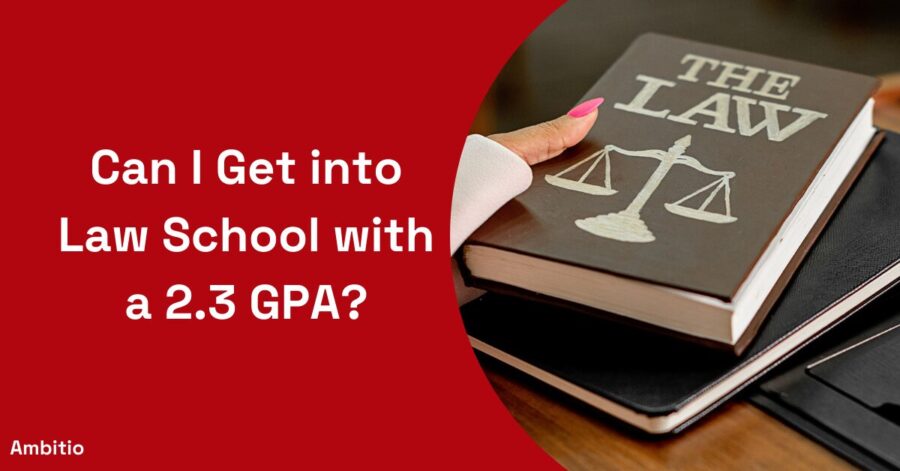12 December 2024
5 minutes read
Can I Get into Law School with a 2.3 GPA?

Introduction
Are you considering a career in law but worried about your GPA? If your undergraduate GPA stands at 2.3, you might be wondering if it’s even possible to get into law school.
This blog will delve deep into the possibilities, strategies, and steps you can take to achieve your goal of attending law school, with a special focus on addressing a low GPA.
Understanding Your Low GPA
The Significance of GPA in Law School Admissions
Your undergraduate GPA plays a crucial role in the law school admissions process. Most law schools have competitive admission standards, and they often require a higher GPA, typically around 3.0 or above.
A GPA of 2.3 falls below this benchmark and is considered low. However, it’s essential to understand that law school admissions are not solely based on GPA; other factors come into play.
Compensate for a Low GPA
Ace the LSAT
One way to offset a low GPA is by excelling on the Law School Admission Test (LSAT). The LSAT is a standardized test that assesses your critical thinking, reading comprehension, and logical reasoning skills. A high LSAT score can demonstrate your academic capabilities and potentially make up for your GPA shortcomings.
Write an Addendum
Consider writing an addendum with your law school application. This allows you to address your low GPA and provide a valid reason for it, such as personal challenges or significant improvement in later semesters. Admissions officers appreciate honesty and transparency.
Secure Strong Letters of Recommendation
Strong letters of recommendation from professors, employers, or mentors who can vouch for your abilities and potential can be a powerful asset in your application. A compelling recommendation letter can help admissions committees see beyond your GPA and focus on your strengths.
Craft a Compelling Personal Statement
Your personal statement is your opportunity to showcase your passion for the law, your achievements, and your determination to succeed in law school. A well-written personal statement can make a positive impression and help sway the admissions decision in your favor.
Take Responsibility and Show Improvement
If you have a valid reason for your low GPA, taking responsibility for your past academic performance and showing a commitment to improvement can be convincing to admissions officers. Explain what steps you’ve taken or plan to take to enhance your academic performance in law school.
Chances of Getting into Law School with a 2.3 GPA
Your GPA is a significant factor in the law school admissions process, and with a GPA of 2.3, it’s crucial to realistically assess your chances of getting into law school. While it’s undeniable that a 2.3 GPA falls below the average admission threshold for most law schools, there are still possibilities to consider.
The Impact of a Low GPA
A GPA of 2.3 is considered low for law school admissions primarily because it raises concerns about your academic preparedness and ability to excel in the demanding coursework of law school.
Law schools want to admit students who are not only passionate about the field of law but also capable of handling the rigorous academic challenges that come with it.
Here’s a closer look at the implications of a 2.3 GPA:
Limited Options
Your chances of gaining admission to highly competitive law schools, especially those with rigorous admission standards, are substantially diminished with a 2.3 GPA. These schools often require GPAs closer to 3.5 or higher.
Holistic Review
Many law schools employ a holistic review process, which means they consider various aspects of your application, not just your GPA. They take into account your LSAT scores, letters of recommendation, personal statement, work experience, and other factors. A strong performance in these areas can compensate for a lower GPA.
Possibility of Rejection
It’s essential to be prepared for the possibility of rejection from some law schools, particularly those with stringent GPA requirements. However, rejection from one school doesn’t necessarily mean you won’t be admitted elsewhere.
Strategies for Success
Excelling on the LSAT
The Importance of LSAT Scores
The LSAT is a critical component of your law school application, especially when your GPA is on the lower side. Scoring well on the LSAT can compensate for a low GPA and demonstrate your aptitude for the rigorous coursework in law school.
LSAT Preparation
Preparing for the LSAT is essential. Consider enrolling in an LSAT prep course or using study materials and practice tests to familiarize yourself with the exam format. Many test-takers significantly improve their scores with dedicated preparation.
Taking the LSAT Multiple Times
You can take the LSAT more than once, and law schools typically consider your highest score. If you don’t perform as well as you’d like on your first attempt, don’t be discouraged. Study diligently and consider retaking the test to achieve a better score.
Strengthening Your Application
Impressive Letters of Recommendation
Strong letters of recommendation are invaluable. Reach out to professors or professionals who know you well and can provide detailed insights into your character, work ethic, and potential as a law student.
Crafting a Persuasive Personal Statement
Your personal statement is your chance to shine. Share your story, your passion for the law, and the unique qualities that make you a promising candidate. Be authentic and compelling in your writing.
Addressing a Low GPA
If you choose to write an addendum, be honest and forthright. Explain any circumstances that led to your low GPA, such as personal challenges, medical issues, or financial hardships. Highlight any improvements or achievements that showcase your potential.
Exploring Your Options
Consider a Range of Law Schools
While getting into a top-tier law school with a 2.3 GPA may be challenging, there are many law schools with varying admission standards. Explore a range of schools, including those that may be more open to applicants with lower GPAs.
Apply to a Diverse Set of Schools
Diversify your application portfolio by applying to a mix of reach, match, and safety schools. Reach schools are more competitive, match schools align with your academic profile, and safety schools have more lenient admission criteria.
Proving Yourself
Excel in Postgraduate Education
If you’ve been out of school for some time since college, consider enrolling in postgraduate courses or programs. Earning strong grades in these courses can demonstrate your academic capabilities and dedication.
Gain Relevant Work Experience
Building relevant work experience in the legal field, such as paralegal work or internships, can bolster your application. It shows your commitment to the legal profession and your ability to excel in it.
Conclusion
In conclusion, while a 2.3 GPA may present challenges, it’s still possible to get into law school with dedication, a strong application, and a commitment to demonstrating your potential.
Explore your options, work on improving your application, and don’t be discouraged by your GPA alone. Many law schools consider a holistic view of applicants, so make sure to highlight your strengths and determination to succeed in the field of law. Remember that perseverance and a clear vision of your goals can ultimately lead you to achieve your dream of becoming a lawyer, even with a low GPA.
FAQ
Is a 2.3 GPA too low for law school?
A 2.3 GPA is considered low for most law schools, but it’s not impossible to get admitted. You can compensate with a high LSAT score, strong letters of recommendation, and a compelling application.
Should I write an addendum for my low GPA?
If you have a valid reason for your low GPA, writing an addendum can help explain the circumstances to admissions officers and show your commitment to improvement.
Can I still get into a top law school with a 2.3 GPA?
Getting into a top law school with a 2.3 GPA is challenging, but not impossible. You’ll need to excel in other aspects of your application, such as the LSAT, personal statement, and letters of recommendation.
What’s the best strategy for improving my chances with a low GPA?
Focus on achieving a high LSAT score, write a compelling personal statement, and secure strong letters of recommendation. Taking responsibility for your past academic performance and showing improvement can also boost your chances.
Can I apply to law school after taking a gap year?
Yes, taking a gap year can provide an opportunity to strengthen your application. You can use this time to gain relevant work experience, improve your LSAT score, or address your low GPA through additional coursework.
How do law schools view applicants who have been out of school for a while since college?
Law schools understand that applicants may have taken a break from academics. Earning strong grades in postgraduate courses or demonstrating relevant work experience can help mitigate concerns about time away from school.

You can study at top universities worldwide!
Get expert tips and tricks to get into top universities with a free expert session.
Book Your Free 30-Minute Session Now! Book a call now




























